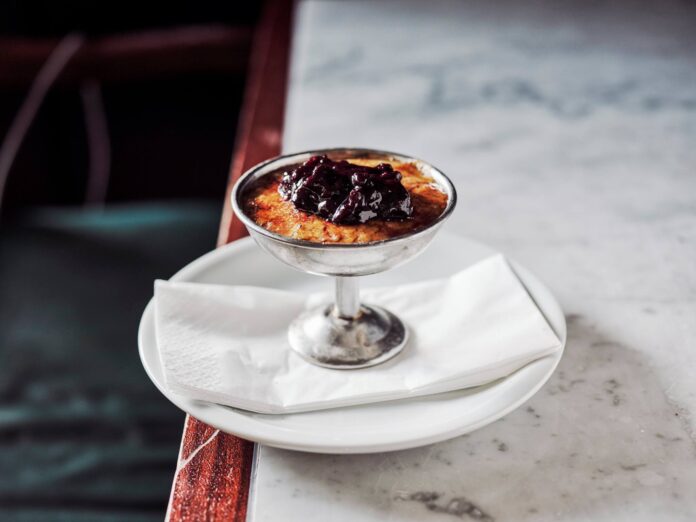Not coffee. Anything but coffee. Is nothing sacred anymore?
We hear the desperation in your voice, and rest assured; we feel you. We’re not here to make sweeping statements about the dangers of the world’s favourite drink (don’t @me, tea), or to tell you to cut down on your coffee. That, when written through fingers already quivering from too much morning caffeine, would be hypocritical.
Instead, we’re here to consider one facet of your morning coffee routine; the timing of your first cup of the good stuff. Experts increasingly believe that drinking coffee first thing, on an empty stomach and before you’ve properly woken up, can increase your body’s production of cortisol, which has an impact on weight, hormonal balance and energy levels.
According to nutritionist Carlyn Rosenblum, via Pure Wow, ”Drinking caffeine first thing in the morning, when cortisol is high, blunts the hormone’s production and shifts the timing of the cycle…This can cause you to produce cortisol at times when it would normally drop (like at night)’’. This is significant because this shifting in cortisol production could wreak havoc on your energy levels and even your gut health.
Instead, the experts recommend holding out for an hour or two before your first cup. Fair enough, but what should I drink to get me going, we hear you cry? Well, here’s a start; our 7 IDEAL morning coffee replacements to kick your day off right.
YERBA MATÉ
If you are someone that needs that caffeine buzz early doors, without the potentially harmful acidity of coffee on an empty stomach, then fear not; Yerba Maté contains the same amount of caffeine as a cup of coffee does.
Made from the naturally caffeinated leaves and twigs of the Ilex paraguariensis plant, which is found in the South American rainforest, Yerba maté is a herbal tea with several reported health benefits; it’s rich in antioxidants and nutrients, and boasts caffeine and theobromine, the elements in coffee which your tired mind laps up.
PROBIOTIC DRINKS
Not as comforting as a nice cup of something hot, sure, but guaranteed to kick your day off right, probiotic drinks are a great choice for those looking to nurture their gut health.
Whilst drinking coffee on an empty stomach might affect the healthy microbiome in your gut, with recent research actually suggesting a positive effect, the jury is still out on how coffee affects your digestion.
Drinks which promote a healthy balance of gut bacteria, such as Kefir, a fermented milk drink akin to thin yoghurt, Yakult, a similar sweetened fermented drink, are great morning replacements for that first coffee if you’re keen for some certainty in the gut department. Alternatively, a generous dollop of yoghurt on your cereal does a similar job!
UNFILTERED APPLE CIDER VINEGAR
Some people might be quite surprised to see vinegar on this list, but it serves a similar function as the probiotic drinks we mentioned above, cultivating positive gut bacteria and supporting digestion.
To make it a little more palatable (if sharp, vinegary flavours when you’re still half asleep aren’t your thing), simply stir a couple of tablespoons through a glass of water, and if you need that morning hug of something warm, you can heat your drink through on the stove or in the microwave.
It’s best to prioritise the cloudy, unfiltered stuff, available in high street health food shops and pharmacies, as opposed to the common salad dressing ingredient from your local Tesco’s, since this contains more of the beneficial, gut-friendly probiotic elements. Bottoms up!
GOLDEN MILK
This is another drink that some people may not be so familiar with, so as an introduction, golden milk, also known as ‘Haldi Doodh’ in Hindi culture, is a caffeine-free drink that uses spices such as cinnamon, ginger, turmeric, cardamom, vanilla, and honey to form the backbone of its flavour and potency. As you can imagine, there are a lot of health benefits that come with drinking this powerful, typically anti-inflammatory drink.
Indeed, there is a rich history behind this frothy and creamy turmeric drink that is well worth reading about.
GUAYUSA TEA
For anyone not familiar with Guayusa tea, it is a source of caffeine that is packed full of antioxidants. Extracted from the Ilex Guayusa tree, found primarily in Ecuador and one of just three caffeinated holly trees on the planet, the leaves are dried and brewed before being consumed.
Drinking guayusa tea gives you that caffeine kick without some of the more pronounced, jittery effects of coffee. In fact, Guayusa tea has long been used to help digestion, improve immune system and might even help with weight loss. Surprisingly, it has also been linked to supporting oral health and promotes teeth whitening, quite the opposite to most teas and coffees, in that respect!
Impressively, the tea is said to boast even more antioxidant capacity than that of green tea, and for fans of flavour, it boasts a smooth, sweet taste, acting as a nice sweet treat in the morning to get you going.
CHAI TEA
Chai tea is a black tea made up of a heady, aromatic blend of herbs and spices. It is quite a popular alternative to coffee as it still has caffeine, but at lower levels than coffee.
Chai tea has antioxidant properties, and may help lower blood pressure and blood sugar, as well as potentially boosting brain power.
Additionally, if you are someone who struggles with the sometimes jittery effects of coffee, then this one reason to drink chai tea instead of a coffee, as the higher caffeine amounts in coffee can sometimes increase agitation. Chai tea, on the other hand, tends to lead to a more mellow buzz.
CHICORY COFFEE
Chicory coffee is known for tasting remarkably similar to coffee, but doesn’t contain any caffeine. In a similar process to coffee beans, the root is roasted, ground up, and then brewed into a hot steaming cup of happiness. You can buy chicory coffee roasted and pre-ground, making it a very easy drink to prepare, ideal for those who are a bit slower in the mornings.
Chicory contains a high quantity of inulin, a naturally occurring polysaccharide which aids digestion and helps promote a healthy gut. Be warned, though, as the drink does its work, it can also cause bloating and gas. Alongside this, it has been advised that if you are either pregnant or breastfeeding that you should not consume chicory root. The reason for this is that there is a significant lack of research on whether the chicory root is safe for pregnant/breastfeeding women.
THE BOTTOM LINE
Swapping your morning cup of Joe for these healthy alternatives doesn’t mean cutting out the coffee entirely. Rather, we hope that we’ve provided you with some tips on expanding your comforting, nourishing pick-me-up repertoire. Cheers!





